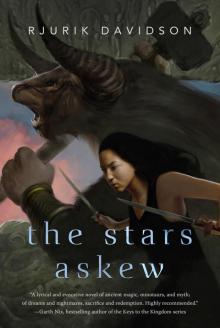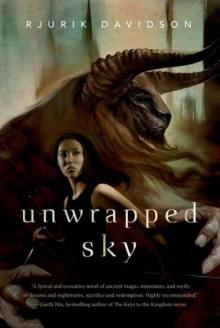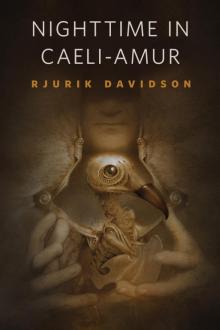- Home
- Rjurik Davidson
The Library of Forgotten Books Page 2
The Library of Forgotten Books Read online
Page 2
I looked up to see the thin figure of Philippe Le Flic, his rubbery lips moving a cigarette around as he sat on the chair next to me. “They say you’re an up-and-comer.” He took a knife from his overcoat and touched the blade with his finger. “They say your gang is making it rich. We’ve had complaints. Tourists. Coming in to the police station. Like beggars to a soup kitchen. Gives the town a bad name. People won’t want to come here. People will talk.” He spoke in clipped sentences, as if each one was unrelated.
“You’ve got your own crews,” I said.
He leaned in to me. “And they’re running out of business. All the prey is being taken.”
“Well fucking teach them properly,” I said, aware that escalation was a disastrous move.
He leaned back and spoke softly, as if weighing up the words. “Fucking teach them...fucking teach them...” Eventually he stood up, slipped the knife back into his coat and left, still muttering, “Fucking teach them.”
I knew what was supposed to happen now. A war would start, and Le Flic would be found, the victim of a tragic car crash, his Citroën having plunged from one of the winding roads and over a cliff onto the rocks below. If not, I would be found wrapped in a fishing net out in the harbour, eyes eaten by fish, my body bloated.
“Emanuel. That was a mistake,” said Marcel.
“I don’t care.”
Marcel sat beside me at the table, a shot of coffee in one hand. “I know what’s happened to you. I’ve seen it a thousand times. All those people, staggering out of the Cinema, thinking their lives will take a particular path. I don’t know why you do it to yourself, when you know it’s a lie.”
“You don’t know what it’s like, seeing yourself. It’s as if you’ve finally found...the truth,” I said. “It’s a terrible thing to see your future.”
“Emanuel. You know that it’s only the future at that particular moment of your life when you are watching the Cinema. Every action you take afterwards changes that future. You will see another image the next time you watch the Cinema. It’s all an illusion!” Marcel took his shot of coffee in one gulp, checked his watch and lit a cigarette. “When the Lumière brothers showed the first movie—a train, arriving at a platform—the audience screamed and fled the theatre.” He sucked thoughtfully on his cigarette and adjusted his emerald cuff-links. We sat there a while and when he finished his cigarette he stood up, put his hand on my back and said, “The screen is not real, Emanuel. There was no train.”
In the days that followed, Elena and I ritually attended the Cinema, watching the coming attractions which now seemed to hold no attraction at all. We caught glimpses of the town and its futures, scattered before us like pebbles on the beach. We saw the future of others in the audience, who left laughing madly or crying softly.
I kept myself amused with fishermen’s daughters and café girls, lifting their bright dresses and having them quickly and emotionlessly in the steep stair-lined alleyways of the town. Like everything it had become a mechanical motion for me.
As we waited one day for the screen to flicker and the pianist to begin, Elena leaned over. “Do you feel guilty scamming tourists?”
“What? They come here with their wallets and their–” I stopped speaking, for it was coming out as rote. “I don’t care,” I said. “I don’t care about scamming them or not scamming them.”
She nodded and placed her hand on my forearm. “We are one now,” she said. “We are the same.”
I shook it off. “You did this to me. You made me like this.”
“Did I make you come to the Cinema? Did I ask you to follow me around?”
I raised my hand to strike her.
“Go on!” she said. “Go on, you peasant.”
I lowered it again. “It’s this damned Cinema. It’s the fact that I know my future. What does yours look like?”
“Come here.” She tried to pull me to her, but I pushed her away. I stood up and said, “I can’t stand this. I can’t stand this Cinema. I can’t stand you.”
She looked at me as if she had been slapped, then reached out. “Emanuel.”
“Don’t you understand?” I said. “I don’t want you anymore. I don’t want anything anymore.” I left her there with the rest of the audience and that fickle screen on which all our nightmares were projected.
I found Petit Pierre and Guy and took them with me down to the waterfront. Along the wooden wharfs we walked. Fishermen in white and blue, little hats on their heads, working on their boats, fixed their lines. I caught snatches of their conversations: “Après l’orage, il m’a dit, ‘jamais plus.’” “Mais bien sur! Il a peur!” Past the fishing boats was the Marina with the sleek yachts, all white and polished with names like La Petite Chanteuse, Pirandello and La Marquise.
We passed them, and I said, “I always wanted to buy a boat.”
“Good to take the ladies out,” said Guy in his booming voice.
Pierre grinned. “A boat would show exactly who you are.”
“Like this one!” said Guy, running along the pier and pointing.
When he was a little way away Pierre looked up at me and said, “Emanuel, there’s talk that Philippe Le Flic is out to get us.”
I shrugged, “Bah, Le Flic is a no-one. Don’t worry about it.”
Pierre looked at me doubtfully. I was handling this all wrong. I was responsible for the gang. They had to trust me implicitly. There could be no doubt in their mind of our success.
“Someone said they saw Guy with him.”
“Don’t worry about it Pierre,” I said wearily. “I’ll talk to Guy.”
“Emanuel, I’ve heard that Le Flic wants us to bring you out on the water one day...”
“Arét Pierre! I’ll handle it.”
Guy was calling us over: “Come on!” We found him standing before a boat. “It’s perfect,” he said, “Look.” I looked down at its smooth lines. Along its prow was written its name: The Tomorrow.
We had become the most successful crew in the town—better than Mad Henri’s, which specialised in cat-burglary, or Simenon’s that scammed old women by posing as an exiled prince and his entourage—and I was approached every day by people who wanted to join. It meant nothing to me.
I did not see Elena for some time, and I did not care. Instead the crew continued our scams, my work becoming lazy and arrogant, until one day, as Pierre was rolling the ball from cup to cup before an Old English Duchess under my apathetic eye, Le Flic appeared suddenly beside them.
“Madame,” said Le Flic. “This is an illegal game...a scam.”
Pierre snatched up his things but Le Flic grasped him by the wrist. Guy and Matthieu both moved backwards and looked across at me.
I took four quick steps, launched myself at Le Flic. My shoulder crashed into his side and he let go of Pierre. Together we fell on the ground.
“Go,” I said to Pierre as Le Flic rolled up, his cruel face red, his eyes wide with rage. He kicked me in the side and I felt burning pain. I curled into a ball. He raised his foot and stomped on my thigh.
“Monsieur!” I heard Marcel’s voice from the café.
Le Flic looked around, straightened out his suit and pulled out a cigarette.
In the Police station, there was barely an interview at all. Le Flic simply walked around me and repeated, “You have no future in this town. You have nothing. You are nothing.” Occasionally he struck me, but I sat stone-faced. I had suffered worse beatings before.
After I was charged, I returned to the square and thanked Marcel for trying to intervene.
“De rien,” he said and gestured with his eyes to the door.
Elena stood there, and she said, “Come with me to the Cinema.”
“No.”
“I thought we had something,” she said.
“You simply cannot bear not being adored.”
She trembled and said, “It’s meant to be. Don’t you understand that it’s our destiny? Come.” She dragged me with her to the Cinema, and I didn’t re
sist.
We sat in those plush chairs, cigarette smoke drifting languorously around us, and again a near-future vision of the town appeared, this time criss-crossed with hovering trams. It was twilight, and it may have been autumn or spring. The camera zoomed past the Place de la Tranquille and down plunging streets to the Place de Conards. There the images slowed and at the corner of the screen, in a little doorway sheltered from the cold and away from the passing pedestrians, stood Elena. She seemed broken down, her bones showing through her body like an old horse’s, her makeup too much for her gaunt face. She was perhaps fifty. She had the appearance of a mad woman, her former glories remembered only in the broken labyrinth of her mind. She crossed the road, dodging a Vespa, and came to a middle-aged man who grinned a toothless grin, wiped his hand on his strained trousers, took a cigarette butt from her and tried to light it with a failing lighter.
In the cinema, I grabbed Elena’s arm. “It’s us.”
When the session was over, we descended the little winding streets and steep stairways, the sighing statues perched on the outcrops, catching the wind in their whistling openings, emitting a wailing into the sea. Filled with a panicked energy, I rambled on about how life was like walking along a set of criss-crossing mountain paths.
We came to the tiny pebbled beach, bounded by cliffs, as if caught in the hand of some rock-giant, boats in the sheltered harbour, and sunbakers turning red under the descending orange sun. At the end of some breathless rant I said, “Don’t you see what this means? Marcel was right. It means our future is in our hands. We can do anything. Every action. Every single day. Every moment alters our trajectory, like a kite in the wind.”
Elena turned and said, viciously, “Don’t you understand? No matter what I do, it always turns out the same. The future never alters for me.”
At Marcel’s we sat in silence. The crazed energy still rushed through me like a drug. I wanted her more than anything.
“I don’t understand,” I said. “Every time you see yourself at the Cinema, it’s always the same?”
She rolled her eyes in a vague way. Perhaps she thought I was a fool. Or perhaps she thought it was self-evident.
I reached out and grabbed her hand, but it was limp in mine. I held it nevertheless. We make our own luck.
I stood, pulled her with me, and took her outside to the cobblestoned square. The summer air was cool, gentle little gusts against my face. Couples crossed the square, arm in arm, or sat on the steps of the Cinema talking softly. A group of drunken youths laughed and called to each other nearby.
“Look,” I said, gazing up at the brilliant stars. “What star sign are you?”
“Virgo,” she said.
“They say your future’s written up there.”
I pulled her close to me and she seemed to me now just a little girl. Her impassive face was that of an innocent, unsure of how to react to the strange world.
She looked past my shoulder as if into another world. Her words came out like a cascade. “I have seen my own death, at the Cinema, you know. I have seen myself being pulled down beneath the water, struggling. I have seen my mouth opening and closing, the way a fish’s mouth does when it is beached. All around me the most wonderful light, as if a thousand multi-coloured lights were cutting at angles...It haunts me. It ruins me.”
I leaned in and kissed her, but it was as if I kissed a mannequin. I kissed her again.
Finally she said, “You still don’t understand, do you? Why do you think I chose you? Why do you think I came to you that first day? It wasn’t for your good looks.”
I stared in incomprehension.
“I saw you at the Cinema. I saw us on the screen together. I had to approach you in the square. I didn’t want to. It was just...the future.”
Her words smashed into me. “Fuck you,” I said. She was like a scam herself. Just when you felt you were about to win, everything was taken away.
She shrugged and we stood there. She seemed so far away from me, as if she was on a screen herself and I just part of the audience. I became aware of someone else next to me. I turned and Guy was saying, “Emanuel...you must come. It’s Petit Pierre.”
Without a look, I left her standing there. Guy and I descended to the wharfs. Along one of the fishermen’s piers, Pierre’s body hung from a wooden pole, wrapped in a fishing net, bloated and black from the water.
Arnaud, the gendarme, approached me and said, quietly and seriously, “Are you his legal guardian?”
“He didn’t have family. I’m the closest he had.”
“I’ll make the arrangements. You can pick up the body from the morgue in a few days. It looks like he just fell in the water, got wrapped up in an old net.”
“Save your breath,” I said.
Guy and I turned and saw Philippe Le Flic at the end of the pier, his cigarette burning in the shadows.
As we walked past he said, “Ah. So things have not exactly gone according to plan...”
Guy grabbed me as my body tensed. He stopped me from launching myself at Le Flic. “Come on, come on,” Guy said.
We returned to Marcel’s and remained late into the night, smoking cigarettes, drinking Marcel’s gout, liquor sharp and strong. At one point I talked to Marcel at the bar.
“When I was a child,” said Marcel, “I used to collect butterflies. I don’t know why. It’s morbid when you think about it. But the most beautiful ones were always the ones I didn’t catch. And afterwards they would double in size in my mind, the brilliant blues and yellows would become richer, more intense, and they would haunt my dreams. One day, I stopped collecting butterflies.”
“You should have been a songwriter,” I said.
“It’s not her that you want, mon ami, it’s the image of her. Why do you want a woman who can’t love you?”
“Marcel, I don’t know.”
“You’re still a peasant. That’s your problem.”
I returned to our booth and Matthieu joined us. We talked of Petit Pierre’s talents, of how he had perfected an innocent look so well that even we would be taken in by it, before he would crack a sly grin and have us all in hysterics. We talked of his small-animal energy, the way during a scam his hands moved so that they were just a blur.
“It’s your birthday next week,” said Guy. “And we’ve got a surprise for you. It was Pierre’s idea. I can’t tell you what it is. But it’s going to be great.”
At that moment I spied Elena standing out in the street, looking in at me like a ghost. I slipped away from the table as Guy talked on.
“Emanuel,” she said, as I approached her in the square, “I’m death. I’m...”
“You’re not. You’re not to me.” I stepped forward again and kissed her; she pushed me away and I fell to my knees.
“I don’t understand,” I said.
“I can’t stand you,” she yelled. “You’re so petty. Look at what you want to be—what, a playboy, a criminal...”
“I just want to be someone.”
“You want to be what everyone else thinks of as someone. But is it what you think of as someone?”
“I love you.”
“Stop lying.”
I hung my head. What was I? Just a peasant from a hill-town, olive-skinned and narrow-minded and here was she, an actress from the capital who understood things I didn’t even know existed.
She looked at me, smiled sadly, shook her head.
“You’re right,” I said, “I’m nothing.”
“Don’t be stupid,” she said and then, a moment later, “I’m going to Paris.”
“You’ve said that before. And have you gone? What’s in Paris anyway?”
She came to me and held my head against her and ran her hands through my hair and said, “Paris is the only place for people like us.”
I took her back to my little apartment with its view of an alleyway, and the far off church spire. We lay there together, holding each other through the cool summer night, and my mind was a jumble of thoughts and
feelings. “Isn’t this what you wanted?” I asked myself. And, “Make the most of this, while it lasts.”
Before she slept, she said, “I thought you were just a criminal, all bluff and bluster. But there’s something else. Sometimes you make me feel...make me feel.”
The next afternoon we sat together in the Cinema. On the screen, buildings with rounded shoulders were hidden within vast green forests and a changed humanity—shorter, with bigger eyes—moved slowly. The reel changed and Le Tour Eiffel towered above the beautiful boulevards of Paris. The vision zoomed across to Montmartre where people sat on the steps of Sacre Coeur and watched a jazz band play as the sun descended over the Parisian skyline. In the crowd, huddled together, were two figures. Again it was Elena and me, arm in arm. We both looked a little older, our faces lined, the planes of our faces broader. The vision cut away just as the Elena on the screen leaned back and rubbed her bulbous and pregnant stomach.
As we walked across the square in the late afternoon I said, “It’s meant to be. You and I are bound together. I’ll wind up the gang and come to Paris with you in two days.”
She looked out over the town and said, “We could live in the Quartier Latin. A little apartment and have lunch at the same hotel each day. But my death–”
“It’s only an image. It’s only a film,” I said. “It’s not real. Let me say goodbye to Marcel and I’ll meet you at your Hotel.”
Marcel was busy in the kitchen so I took a booth at the rear and ordered anchovies in oil and red wine. My life had been turned upside down and was now full of possibility, full of uncertainty.
Philippe Le Flic walked towards me from the front door. He stopped beside the booth.
“Fuck off,” I said to him.
“I thought you might have thought differently.” He turned around and dragged a chair across.

 The Library of Forgotten Books
The Library of Forgotten Books The Stars Askew
The Stars Askew Unwrapped Sky
Unwrapped Sky Nighttime in Caeli-Amur
Nighttime in Caeli-Amur